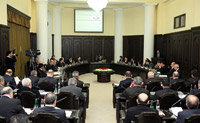Tsakhkadzor is an interesting place. Even if it fails to become an international center for tourism as promised by the officials, it will for sure be a place for expressing interesting ideas and opinions.
Yesterday very interesting ideas were spoken by prime-minister Tigran Sargsyan in Tsakhkadzor. The government’s official statement reads that the prime-minister has participated in a conference entitled Armenia’s independent economy’s 20 years, which was organized by the students’ council of the Economic University of Yerevan and Youth Foundation. The prime-minister spoke about the challenges and opportunities of Armenia’s post-crisis economy, the roots of the crisis, related processes and consequences. The fact of the conference being held in Tsakhkadzor itself is not strange at all. It is neither strange that it was organized by the Youth Foundation, the president of which is Karen Avagyan from the RPA. It is not strange either that the PM is delivering a lecture on the topic of crisis even though we have already overcome the crisis. The most interesting thing is two ideas expressed by the PM during this conference. The PM said that now one of the primary goals of the government should be encouraging the formation of an environment to collect savings. “The financial resources collected from those savings should be used for the purpose of developing the economy. The pension reforms we have initiated are done for this purpose too. Pension collection funds will be created, where the citizens will collect their savings for the future days,” said Tigran Sargsyan. The PM says that paying for the inner demand on the account of foreign borrowings is very dangerous. For this purpose domestic development mechanisms should be created, which is a matter of time. This is taken from the official media release of the government. This is the first time the prime-minister is speaking about the danger of foreign borrowings. Before this conference the PM had opposed to any critics concerning foreign debts. He used to say that foreign borrowings were not dangerous and this was done for the purpose of providing macroeconomic stability. Let’s recall the fluctuations of the foreign debts during this time. In 2007 the foreign debt was 1.2 billion dollars, in 2008 it was 1.577 bln, in 2009 – 2.966 bln, in 2010 – 3.299 bln, and in the end of 2011 it hit a record and reached 3.568 billion drams. This means that every citizen of Armenia has a debt of 1,200 dollars. Meantime, the citizen of Armenia that has this debt cannot understand and be sure why this borrowing was taken and on what it has been spent. Now it seems that the government is concerned of the foreign debt. They have believed in the critics addressed to them and have changed. Now they want to focus on domestic resources and collect the resources and savings of the society to circulate in the economy. It is better late than never.
The next interesting idea the prime-minister said is that “states should develop equally and resources should be allocated equally – from the rich to the poor, which us the main precondition for fighting against economic polarization.” “Currently the world economy is characterized with the fact of being interconnected. The customs limitations should disappear step by step, trade liberalization must be developed and the world market should developed in a common system,” said the prime-minister.
If one that listens to these words is not aware of the situation and economy in Armenia, he/she may think that during the recent the government has been trying to reallocate the resource of the society (e.g. reallocation or the purpose of reducing the margin between incomes) and they have had success. People who are not aware of the situation may think that this policy has resulted in reduction of poverty. However, even the official statistics reports that the government has no reason to be proud. Disproportion between incomes and consumption is calculated with the index of Jin. This index is between 0 and 1. The higher the Jin index is (the closer it is to 1), the higher inequity is. The National Statistics Service has published a report on Food availability and poverty. This index was 0.339 in 2008, 0.355 in 2009, and 0.362 in 2010. The same index according to unequal consumption was 0.242 in 2008, 0.257 in 2009, and 0.265 in 2010. Even the official statistics reports that the polarization got even deeper in 2008-2010 and the finances were allocated not from the rich to the poor, but the vice versa. The index of poverty has got no better either. The level of poverty has grown significantly. The level of poverty was 27.6% in 2008, 34.1% in 2009 and 35.8%i in 2010.
The growth of poverty can connected with the crisis and inflation too. However, polarization of incomes means that during the crisis the number of poor people has even grown. Notwithstanding these negative tendencies the officials use the word “social” often in their speeches.
In consideration of these negative tendencies it is hard to accept the prime-minister’s speech. Why are they speaking of things that should be done if they do not do those things? On the other hand, the PM literally said, “A state must develop equally.” This means that maybe he did not speak of Armenia but generally and maybe other countries rather than Armenia. If these pledges do not work in Armenia, the consequences will be bad.

